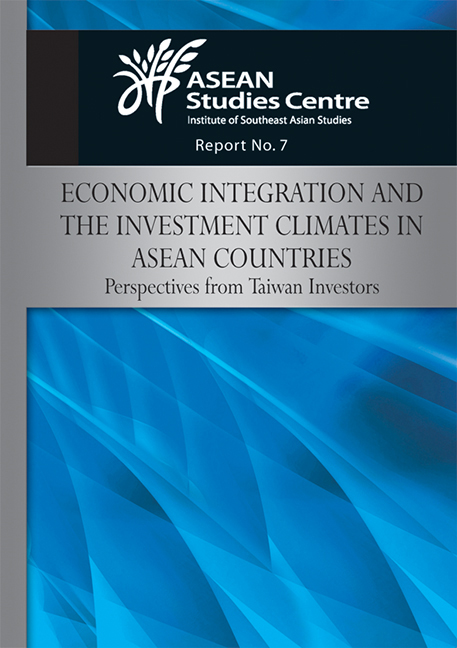 Economic Integration and the Investment Climates in ASEAN Countries
Economic Integration and the Investment Climates in ASEAN Countries Book contents
- Frontmatter
- Contents
- Introduction
- I Economic Integration and the Investment Climates in ASEAN Countries: Perspectives from Taiwan Investors
- Background of the Symposium
- Opening Remarks
- Session 1
- Session 2
- Session 3
- Questions and Answers
- Conclusion and Policy Suggestions
- II Background Papers
- Annex I: Programme of the Symposium
Session 3
from I - Economic Integration and the Investment Climates in ASEAN Countries: Perspectives from Taiwan Investors
Published online by Cambridge University Press: 21 October 2015
- Frontmatter
- Contents
- Introduction
- I Economic Integration and the Investment Climates in ASEAN Countries: Perspectives from Taiwan Investors
- Background of the Symposium
- Opening Remarks
- Session 1
- Session 2
- Session 3
- Questions and Answers
- Conclusion and Policy Suggestions
- II Background Papers
- Annex I: Programme of the Symposium
Summary
34. The last session was in the form of a roundtable discussion involving Taiwan business leaders and scholars. There were four panellists — Dr Yau-Jr Liu, Associate Research Fellow, Taiwan Institute of Economic Research; Mr Pao Chuan Lin, Vice President and Head of International Administration Department at Chinatrust Commercial Bank; Dr Jang Pao Kang, Associate Professor at National Chengchi University; and Dr Jiang-Jong Guo, Associate Professor, Graduate Institute of China Studies, Tamkang University.
35. With family businesses in Singapore and Vietnam, Dr Yau-Jr Liu, shared some of the results of his research and his opinions about doing business in ASEAN countries. Traditionally, Taiwanese firms invested in ASEAN countries for four reasons. One was to make use of abundant resources. Thus, Taiwanese firms invested in Malaysia and Indonesia and more recently moved to Vietnam and Cambodia. These were in labour- and resource-intensive industries. Another reason was market expansion, especially for staple industry manufacturers. These were located in populous countries like Indonesia, the Philippines, Thailand and Vietnam. Thirdly, in the last ten years, Taiwanese investors sought involvement in the international production chains in ASEAN. The fourth reason was to spread risks, especially in the case of investors in China. Recently, there had been policy changes in China, and several of them were not very friendly for the Taiwanese manufacturing sector. Hence, many firms moved to the northern part of Vietnam or elsewhere in ASEAN. Even with the current global economic crisis, the four motivations remain intact as ASEAN countries are less exposed to the crisis compared to some other economies.
36. Nevertheless, cost savings and market expansion remained the crucial driving forces for Taiwanese investors to move into Southeast Asia. However, moving would pose some risks to these businesses. Firms that moved rapidly to ASEAN countries could overlook problems like labour shortages or strikes by labour unions (Vietnam, Indonesia and Thailand). Hence, business people must think of spreading their risks among ASEAN countries. In Thailand, even though the cost of labour was a bit higher, the problem of strikes was less. Taiwanese businessmen should look at the risk to a firm's value rather than simply at cost savings.
Information
- Type
- Chapter
- Information
- Economic Integration and the Investment Climates in ASEAN CountriesPerspectives from Taiwan Investors, pp. 13 - 18Publisher: ISEAS–Yusof Ishak InstitutePrint publication year: 2009